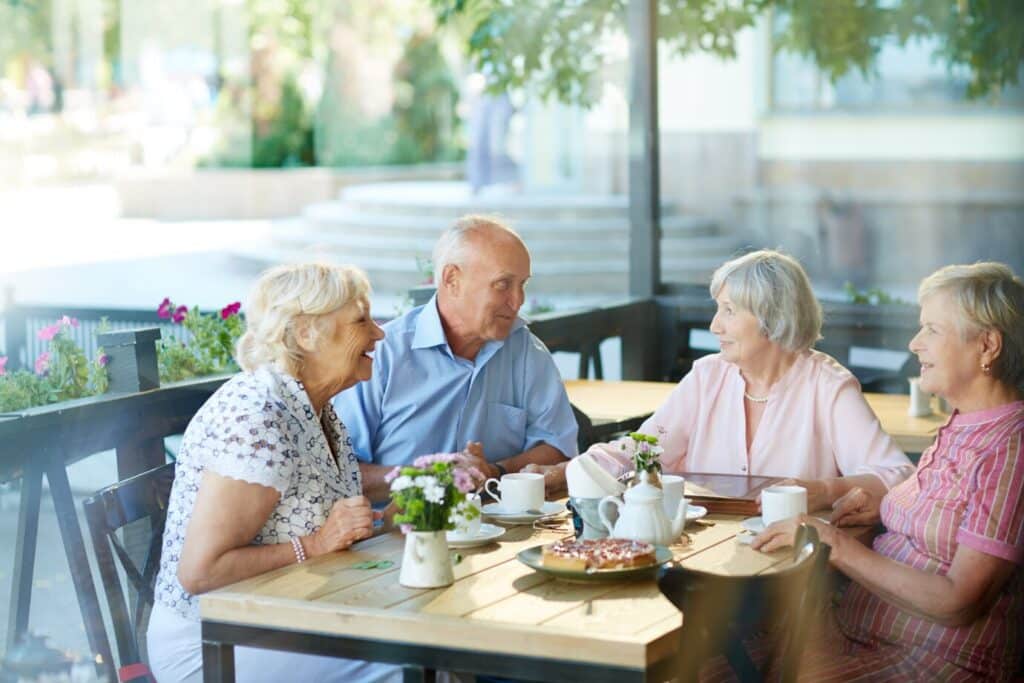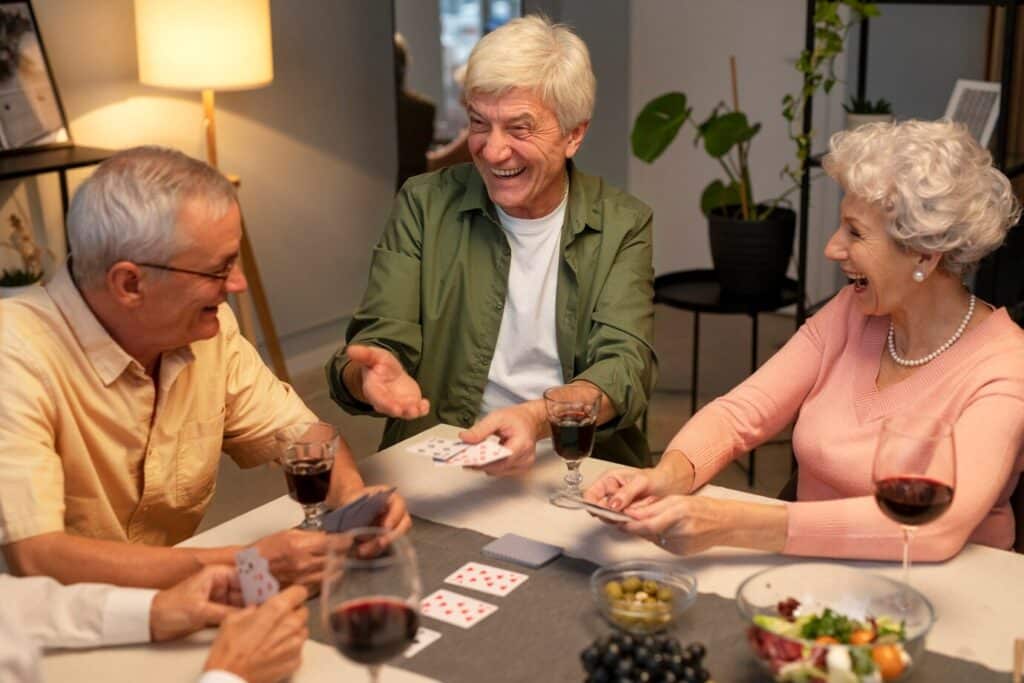Senior Social Activities To Enhance Cognitive Function
Social interaction is a powerful tool in promoting mental sharpness and emotional well-being for seniors. At Westmont of Encinitas, engaging in senior social activities goes beyond fun and games—it plays a vital role in preserving cognitive function and improving quality of life. Whether through group games, creative classes, or shared meals, staying socially active is key to maintaining a vibrant mind.
These interactions become especially impactful in a supportive environment, where every connection contributes to a sense of belonging and purpose. From senior social activities near you to therapeutic programs, there are countless ways to stay mentally active and emotionally fulfilled. Let’s explore how seniors can enhance their brain health and happiness through meaningful social engagement.
The Link Between Social Activity and Brain Health
When older adults participate in senior social activities, they engage multiple areas of the brain, which helps reduce the risk of cognitive decline. Research consistently shows that social engagement helps maintain memory, attention span, and decision-making abilities. Activities such as storytelling, sharing meals, or playing trivia games strengthen neural pathways and reduce feelings of isolation.
At Westmont of Encinitas, residents benefit from various group activities designed to enhance mental agility and emotional well-being. From daily fitness classes to arts and crafts, every moment spent socializing brings mental stimulation and joy. These positive interactions contribute to a holistic approach to healthy aging.
For even more ideas, this article on group recreation and games outlines creative ways to stay socially active.
Fun and Free Ways to Stimulate the Mind
Stimulating the mind doesn’t require expensive memberships or complex schedules. In fact, many free activity ideas for seniors offer just as many cognitive benefits as structured programs. Simple games like crossword puzzles or storytelling circles promote memory retention. Gardening groups, neighborhood walking clubs, and local library meet-ups also provide enriching experiences at no cost.
Communities that offer fun activities for the elderly in nursing homes, like Westmont, often include sing-alongs, bingo, or movie nights—each with a layer of cognitive engagement. These events combine enjoyment and brain stimulation in a relaxed, welcoming environment. Staying mentally active doesn’t have to be formal; everyday conversation and laughter go a long way.
Continuous Learning Keeps the Mind Young
Lifelong learning is one of the most effective ways to support brain health. Whether it’s picking up a new hobby, attending a guest lecture, or joining a computer class, senior social activities for adults that involve learning introduce novelty, challenge, and focus—three crucial components of cognitive stimulation.
Westmont offers programs encouraging residents to explore new topics and skills, including language classes and art workshops. This emphasis on continuous learning provides a sense of purpose and growth, improving mental sharpness and emotional satisfaction. According to this article on continuing education, structured learning environments can even delay cognitive decline.

Unique Social Activities That Enrich Life
Adding variety to your daily routine can bring excitement and energy. Unique activities for seniors, such as interactive cooking classes, pet therapy sessions, or cultural exchange events, offer new sensory experiences that strengthen the brain. These activities encourage creative thinking, emotional connection, and hands-on engagement.
At Westmont, events like intergenerational storytelling sessions or themed game nights create opportunities for deeper connection. Engaging in out-of-the-ordinary senior social activities near you can also reignite passion and purpose, reminding seniors that discovery doesn’t end with age. For inspiration, check out these educational topics for seniors.
Creative Hobbies to Sharpen the Mind
Creative outlets such as painting, knitting, or journaling can significantly impact memory and concentration. These hobbies are more than pastimes—they are brain workouts. Whether enjoyed individually or in a group, they promote problem-solving, patience, and fine motor skills.
Free activity ideas for seniors often include group painting classes or poetry clubs that encourage both introspection and social connection. These artistic pursuits have been shown to improve mood and reduce symptoms of anxiety or depression, while also nurturing friendships among residents.
Building a Supportive Social Environment
The setting in which seniors engage socially can influence the benefits of those interactions. A safe, welcoming environment fosters trust, participation, and comfort. At Westmont, the design of communal areas—such as libraries, patios, and lounges—invites spontaneous and structured socialization.
Programs tailored to various interests make it easier for newcomers to join in. Whether it’s game time, group meals, or themed events, each interaction strengthens the bonds that make up a community. Creating an environment that encourages senior social activities for adults is a crucial step in promoting cognitive and emotional wellness.
Activities Designed for Nursing Home Residents
Fun activities for the elderly in nursing homes must be stimulating and accessible. Westmont incorporates sensory activities, music therapy, and modified fitness routines that meet all ability levels. These programs not only help reduce boredom but also promote mental alertness.
Residents are often invited to contribute to planning, ensuring that activities remain meaningful and diverse. Every experience is designed with enrichment in mind, from community choirs to reminiscing groups. Even small group interactions, such as tea socials or storytelling circles, significantly affect brain function.
Tech-Supported Cognitive Engagement
Technology can enhance traditional senior social activities by offering virtual tours, brain games, or video chats with family. Seniors are increasingly comfortable with tablets and smart devices, which opens up even more ways to engage socially and mentally.
Westmont’s tech-friendly environment supports digital hobbies like online learning, eBooks, and memory apps. Even virtual reality experiences are being explored to offer immersive trips around the world—all from the safety of a senior living community.
Local and Accessible Social Options
Sometimes the best social experiences are the ones that are close to home. Many seniors benefit from senior social activities near you offered by local libraries, senior centers, and religious organizations. These community-based events provide free or low-cost opportunities for engagement and connection.
Participating in local events, whether it’s a morning yoga class, a knitting group, or a community lunch, fosters inclusion and enhances well-being. These activities are often intergenerational, offering unique bonding experiences with people of all ages.
For a national guide to local options, visit Eldercare Locator or Senior Planet. Both offer searchable tools for finding programs in your area.
Socializing Is Self-Care
Participating in senior social activities is not just about being busy—it’s a form of self-care that strengthens the brain, boosts mood, and builds community. Whether through fun activities for the elderly in nursing homes or unique activities for seniors at local events, the benefits are both immediate and long-lasting.
Engagement combats loneliness, promotes independence, and enhances quality of life. At Westmont of Encinitas, we prioritize these meaningful experiences so each resident can thrive mentally, emotionally, and socially. We invite you to explore our community and discover how vibrant life can be when connection is at the center.
To learn more or to schedule a visit, click here or call us at 760-452-6037.
How Do The Costs Of Moving Into A Quality Senior Care Community Compare With The Costs Of Staying At Home?Compare The Costs of Senior Living vs Staying at Home
Frequently Asked Questions
What are social activities for seniors?
Social activities for seniors include a wide range of events and interactions that promote connection, engagement, and well-being. These may involve group games, hobby clubs, dance classes, community outings, or even virtual meetups. Staying socially active can reduce loneliness and support mental and emotional health. Many senior centers and assisted living communities offer structured social programs tailored to different interests.
Is there really a $900 grocery stimulus for seniors?
There have been online rumors and misleading ads about a $900 grocery stimulus for seniors, but no official federal program currently provides this specific benefit. However, low-income seniors may qualify for food assistance through programs like SNAP (Supplemental Nutrition Assistance Program) or state-run senior nutrition initiatives. Always verify benefits through official government websites like Benefits.gov. Be cautious of scams that ask for personal information in exchange for false stimulus claims.
What are the 4 types of social activities?
The four main types of social activities are physical, cognitive, recreational, and volunteer-based. Physical activities include group walks or fitness classes; cognitive ones involve games or discussions that stimulate the mind. Recreational activities cover hobbies like arts, music, or gardening, while volunteer-based activities allow seniors to give back through mentoring or community service. Each type supports different aspects of a senior’s health and happiness.
How do I keep my 70-year-old busy?
Keeping a 70-year-old engaged involves offering a mix of physical, mental, and social activities tailored to their interests and energy level. Encourage hobbies such as reading, puzzles, gardening, or crafting, and consider exercise like walking or yoga. Social interaction is key—community groups, senior centers, or regular family visits can provide meaningful engagement. Volunteering or learning new skills online can also offer a sense of purpose and connection.








